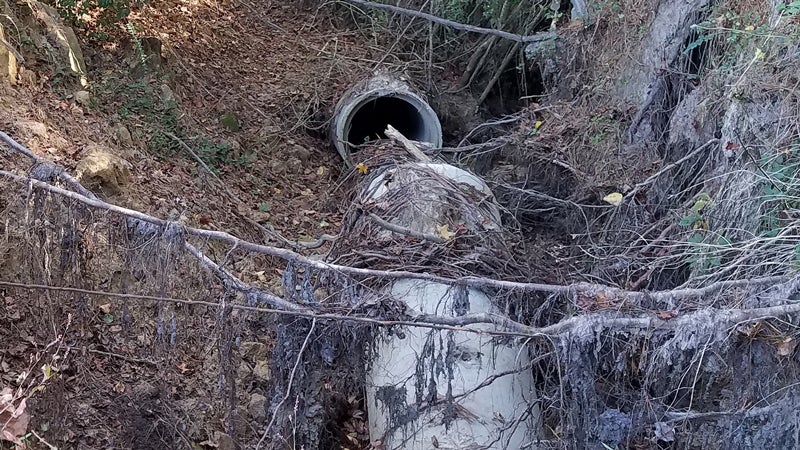Stormwater lawsuit against Isle of Wight County dismissed, appealed
Published 5:44 pm Friday, February 23, 2024

- Otis Brock, who died Dec. 11, 2022, had been one of three plaintiffs in a federal lawsuit alleging Isle of Wight County illegally took and damaged his and his neighbors' land by refusing to repair a collapsed stormwater pipe that spans their properties. (Nov. 10, 2020, file photo by Stephen Faleski | The Smithfield Times)
A federal judge, in late November, dismissed a deceased Carrollton man’s lawsuit against Isle of Wight County over a collapsed stormwater pipe.
Joseph Sherman, the lawyer representing Brock’s estate, has since asked for reconsideration and taken the case to the Fourth District U.S. Court of Appeals in hopes of reversing the dismissal. An opening appellate brief is due in May, Sherman said.
Otis Brock, who died in 2022 at age 88, and his neighbors, Brian and Sue Fernaays, filed the suit in 2021 alleging Isle of Wight had illegally taken and damaged their lots on Deep Water Way in Carrollton’s Brewers Creek subdivision by refusing to repair the now-exposed concrete pipe, which has broken apart in multiple places.
The Fernaayses and Brock’s daughter, Lisa Rhodes, who took his place last year as plaintiff, blame the county for the runoff that comes rushing through the broken pipe whenever it rains and the resulting sinkhole that’s grown into a 20-foot chasm along the property line.
U.S. District Court Judge Arenda Wright granted summary judgment in favor of the county on Nov. 27, which allows a judge to rule on the merits of a case without the matter reaching a jury.
The neighbors and the county had filed dueling motions for summary judgment in 2022, each arguing there were no facts in dispute and that the law was unequivocally on their side. The county maintains it doesn’t own the pipe in question and isn’t responsible for repairing it.
Isle of Wight County court records show a 20-foot easement for the pipe spanning 10 feet into each of the adjoining yards, but a specific owner for the easement wasn’t designated in the early 1990s when the stormwater system was installed.
Wright’s ruling notes the original subdivision agreement for Deep Water Way “is no longer available” but would have been “based on a form” used for White Heron Way, another street in the same development, according to an affidavit by Amy Ring, the county’s director of community development. The White Heron agreement Wright quoted in her ruling states subdivision plats “shall not be deemed to be an acceptance by the County of any street, alley, public sewer or other physical improvements shown on the plat” and that “the owner shall be fully responsible therefor and assume all of the risks and liabilities.”
Though Wright’s ruling acknowledges the county “did repair collapsed drainage infrastructure within other subdivisions between 2010 and 2014” Wright contends the county’s “policy choices” are “not relevant” to determining whether the county owns the Deep Water Way easement.
Sherman, in a separate lawsuit he filed last August seeking class-actions status for Brewer’s Creek residents, contends the county only began disputing ownership of stormwater outfalls in 2014 when county officials started lobbying the Virginia Department of Environmental Quality to release Isle of Wight from its municipal separate storm sewer system or MS4 permit obligations on grounds that it didn’t own or operate a municipal stormwater system. Sherman’s class-action complaint, which names Marsh View Court residents Vincent and Andrea Fuschetti as lead plaintiffs, is now on hold pending the outcome of Sherman’s appeal in the Deep Water Way case.
The consequences
Isle of Wight’s DEQ lobbying campaign proved successful in 2016, which allowed the county to reduce the stormwater fee it adds to the real estate bills of residents and businesses by about 25% that year – forcing it from $72 to roughly $53 per year for most residents.
Sherman’s class-action complaint alleges the Fuschettis’ 2019 complaint of a similar sinkhole opening up in their yard at the site of a failed stormwater easement was the impetus that prompted county officials that same year to author a document intended for the Virginia Association of Counties, which referred to stormwater pipes without a clearly stated owner as “orphaned outfalls.”
If the county were to acknowledge municipal ownership of a stormwater system or agree to maintain or repair infrastructure that’s privately owned or lacks clear ownership, it could again find itself subject to an MS4 permit and potentially would need to increase its stormwater fee to cover the cost, the “orphaned outfalls” paper argues.
County officials, who did not immediately respond to The Smithfield Times’ request for comments on the ruling, had acknowledged in 2020 that, as of November that year, they were aware of at least 28 similar complaints involving outfall pipes.
Sherman, in a Feb. 23 statement, called the ruling “not just a bad outcome for Brewer’s Creek homeowners, who now take on the burden of the maintenance of an underground drainage pipe attached to a state road” but also one that “incentivizes” more “abuse by government.”



